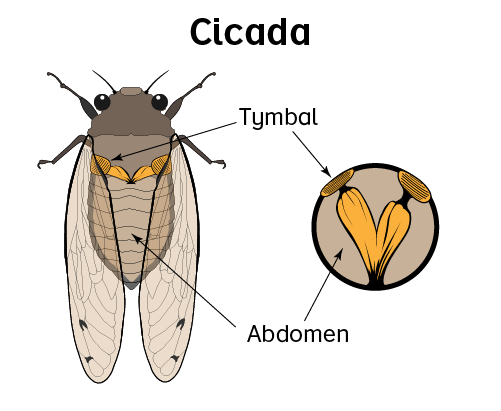Cicadas are famous for their loudness. In late summer months, when fall is on the way, the song of cicadas starts to resonate in the woods. This high-pitched, piercing song is actually a mating call produced by male cicadas. There are over three thousand species of cicadas. The males of each species have their own distinctive song that is only recognizable to females of the same species. This allows different species to reproduce successfully. Although you may find it hard to tell which direction a male cicada’s sound is coming from, the female cicada has no problem locating the source of the sound.
Cicadas usually sing during the heat of the day. The hotter the day, the louder the male cicada is likely to be. Except for some larger species that can produce a sound of over one hundred twenty decibels, cicadas normally sing at a volume below the pain threshold of the human ear. However, their songs can be painful to the ears of many animals, including their main predators, birds. The cicada’s sound interferes with communication between birds, making it difficult for them to hunt in groups. In fact, male cicadas in the same family tend to stick together when singing. This increases the total volume of their noise, which not only helps them attract mates, but also protects them from birds and other predators.
The organs that male cicadas use for singing are called “tymbals,” which are a pair of membranes at the base of their abdomen. The cicada sings by rapidly vibrating the membranes. Muscles attached to the membranes contract and relax to produce a sound. The sound is then amplified by the cicada’s body. It works in much the same way as the body of a musical instrument, such as a guitar, amplifies the sound of the vibrating strings. Scientists have worked hard to understand cicadas and their sounds, but they still don’t fully understand how the cicada coordinates its tymbals and body to produce sounds of such extreme volume.
